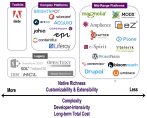Have CMS systems struggled to keep abreast of Media publishing requirements?
Ezra Klein, a star columnist with the Washington Post, has left his job to join a new publishing outlet Vox.com. What prompted him to leave the venerable WaPo? No, Klein is not leaving because of the paper’s new owner, Jeff Bezos. He says he's leaving because their traditional Web Content Management System constrains the publishing possibilities he imagines.
At RSG, we know Web CMS platforms quite intimately – after all we’ve kept close tabs on this technology from its nascent years in the early dot-com phase to the present Cloud-Mobile-Social period. A couple of themes that we’ve consistently called out are the sub-optimal CMS experience for content authors and how your CMS architecture could constrict content publishing.
To elaborate: Implicitly or explicitly, the architecture of many CMSes assumes that the content publishing process follows a set routine – an author publishes an article and it is reviewed or edited by someone else before publication. Yes, content can be routed differently through a workflow but the basic idea remains the same. In this world-view, the readers play a passive content-consumption role, context is provided through links to related content, and usually the author moves on very quickly to the next article.
But as we’ve seen time and again, this model fails in many business scenarios -- particularly in the Media & Entertainment industry. Breaking stories, or more generally, where a content item needs to be updated frequently, is one instance. To be sure, “write once, publish many” is the CMS mantra but it means publish the same content to different channels, not update the same content multiple times. Similarly, editors increasingly want more control over lists of things that your CMS would normally consign to an automated query.
Many Web CMSes struggle with user generated content as well. If you want to highlight a few user comments in your copy, or promote them alongside the copy, you’ll very quickly hit against traditional CMS limitations. Ditto if you want to “curate” content from different sources, such as an Instagram photo, Twitter updates, and use a mash-up of some related items alongside an article.
In short, the notions of what constitutes “content” have changed significantly. Creating compelling online content experiences today requires a lot more flexibility and newer capabilities from the underlying content publishing systems, and most traditional CMS platforms have not fully kept pace with the changes. This is particularly the case for Media firms, where many custom solutions -- like the system Vox.com has built -- continue to arise despite a broad marketplace of packaged software alternatives.
If you work for a media and entertainment (or any other kind of) company, we'd be happy to review your options with you.








